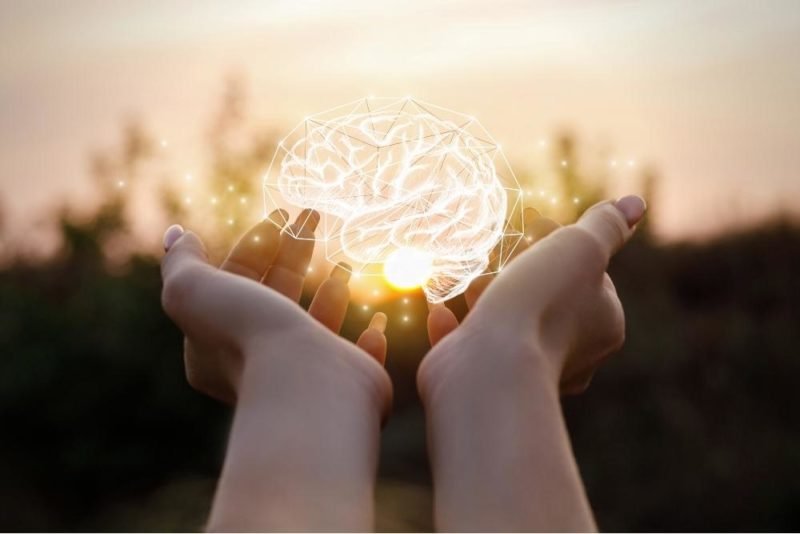What to do when your brain chases food rewards
[ad_1]

In our modern foodstuff surroundings, most of us are blessed to have completely ready obtain to a variety of food items. But what is difficult is that we are also exposed to a good deal of visible food cues, which includes:
- Ads
- Open-idea kitchens
- Coworkers bringing in cookies or doughnuts
- Chips and candy in close proximity to the sign-up even at retailers that never mainly sell meals
This variety of environment can make it additional demanding to simply just try to eat when we detect we’re hungry. As an alternative, we might want to consume just simply because we lay eyes on a food stuff that looks delicious. About time, visible meals cues may well guide us to eat when we’re not hungry a lot more than we would if those cues weren’t current. (Take note: this is less very likely to materialize for people today who in no way had their inner intuitive eater knocked out of them, or who have reclaimed and practiced intuitive feeding on capabilities). We’re consuming for the reason that we are trying to get a reward, and that reward isn’t (or isn’t only) the fulfilling of hunger.
Why does this come about? Let us look into.

Evolution and your brain
Some behaviors that don’t make functional perception nowadays (and may well even result in us distress) manufactured a ton of feeling to our prolonged-ago ancestors. If you were an early hunter-gatherer, remembering how to access excellent sources of foodstuff (which watering gap the wooly mammoths like, where to locate the berries that are not poisonous…and when they’re in season) would assistance make it doable for you to endure so you could acquire portion in perpetuating the species.
Remembering this essential food information and facts demands both beneficial or damaging reinforcement (or both equally).
- With favourable reinforcement, you get a reward for using a certain motion.
- With negative reinforcement, you reduce a thing adverse by having a sure action.
Equally sorts of reinforcement enhance the odds that you will just take that motion once again in the potential, simply because when our brains make the relationship concerning an motion (or habits) and a reward, it makes a strong psychological memory.
Mentioned a different way, if you try to eat a delectable foodstuff, and it will make you truly feel good (positive reinforcement), you embed a memory that helps you later remember in which you obtained the food items, what you appreciated about it, the circumstance in which we ate it, and so on.
Similarly, if you are stressed or unfortunate or nervous, and you eat a thing that will help you experience much less poor (destructive reinforcement), you may embed a memory that having sure meals lowers sure unpleasant feelings.
I see the effects of this “brain training” for food items benefits perform out in different ways, most notably “food addiction” and dieting.

The “rewards” of dieting
Let’s say you are counting energy, carbs or excess fat grams—or in any other case “watching what you eat” or “controlling part sizes”—and you do reduce pounds (as most individuals do for the limited time period). If you get compliments about your shrinking overall body, that serves as beneficial reinforcement to preserve executing what you’re carrying out. That can help compensate for the soul-sucking mother nature of ingesting “good” foodstuff that you never seriously like and supplying up “bad” meals that you adore.
Chasing the benefits of compliments, praise and acceptance keeps persons chasing fat reduction, which perpetuates yo-yo dieting.
(There is one more side to this coin, even so. I’ve had clients who were in a stage of their existence where they had been more energetic than normal and consuming “normally,” and misplaced some weight as a facet effect. Then the compliments begun coming, which created them uncomfortable—not all people wishes their system to be commented on, even in a “positive” way—which triggered them to start off binge feeding on and/or staying significantly less lively so they could stay indoors and hide their system. When they gained pounds and the system enhances stopped, this served as a negative reinforcement to stay on this route.)
Let us not forget that restrained having (food items restriction) generally leads to rebound having. This rebound ingesting may possibly feel like emotional having, “out-of-control” taking in, or binging. In some cases, it may perhaps truly satisfy the scientific definition of a binge, and of binge taking in disorder (Bed).
The perpetuation of this rebound consuming in response to precise or even perceived restriction (scarcity), is driven by meals tasting so substantially additional rewarding right after we’ve been deprived of it. On that note…

Fueling “food addiction”
On the “food addiction” front, I have experienced shoppers who experienced really powerful psychological feeding on tendencies. In some cases this commenced in childhood (when they were far too young to have produced other signifies of coping). Often this commenced in adulthood (all through really demanding, incredibly busy periods of lifestyle when having time for significant self-care was a pipe desire).
Do you consider that employing food to come to feel loved and cared for (constructive reinforcement) or to numb out (adverse reinforcement) creates strong emotional recollections? Yes it does.
It is this reinforcement, and these psychological recollections, that continue to keep neglected little ones locked in an emotional ingesting cycle a long time later on even if they now have a loving spouse, great good friends and a fulfilling life. It is what helps make a health-related or mental wellbeing experienced (who you might assume would “know better”) realize that they have no coping tools other than food simply because food constantly worked so effectively for them that they hardly ever bothered to diversify their coping toolbox.
There is some proof that so-identified as “highly palatable” foods (processed foodstuff higher in additional sugar, salt and excess fat) can have an even far more fulfilling influence. It can get to the issue the place we so strongly anticipate that reward when we eat these foods that it’s incredibly hard to resist visual cues related with those foodstuff. For instance, a picture of somebody consuming ice product, a pizza ad on Tv set, donuts (even stale donuts) in the split room.
So is this meals addiction, or is it mind schooling?

Retraining the brain
Irrespective of what you simply call it, ingesting that feels psychological or out of manage in some way could experience fantastic in the second, but then not so good afterwards.
- You could possibly feel guilt or disgrace (which you truthfully don’t should have)
- You may have eaten to the level of actual physical discomfort
- You may possibly dread bodyweight achieve (even although your having could possibly not basically be creating excess weight obtain and halting emotional/binge consuming may possibly not guide to fat reduction)
Which of these equipment is ideal for retraining your brain concerning food stuff benefits?
- Willpower
- Mindfulness
- A lobotomy
Oh, I hope you said B! Willpower is authentic, but it is not an infinite useful resource, and we use it up as we make conclusions and deal with stressors during the day. (When you want to say a little something snarky to a co-worker or honk at a rude driver, and you really do not, you just employed up some willpower.) And I’m not even going to comment on the thought of a lobotomy.
Making use of mindfulness in this context includes:
- Starting to be knowledgeable of our behaviors and what triggers them
- Discovering and recognizing the genuine rewards (physical sensations and psychological outcomes) we get from the behavior—without judgement (!)
- Working with that details to make a compassionate option that supports self-treatment
When getting a typical mindfulness meditation follow can aid with this, a short, informal, in-the-minute exercise, such as this version of the RAIN meditation, may possibly be extra useful:
- Recognize the craving/ingesting impulse
- Allow the encounter to exist, just as it is
- Investigate with fascination and treatment what it feels like in the system
- Note the relevant actual physical sensations from minute to moment, with self-compassion
If you would like to learn extra about RAIN, Tara Brach discusses it nicely on her web page.

The bottom line
It is quick to get stuck in recurring conduct patterns that we did not consciously choose and may perhaps also be repeating endlessly without the need of creating a aware decision to do so. These designs aren’t constrained to food…we could find ourselves repeating particular styles in our relationships, our purchasing habits, and other features of lifestyle.
When we can shine a self-compassionate gentle on what we’re undertaking and why we’re doing it, it opens the door to creating a mindful alternative, no matter if that option is in alignment with our recognized pattern, or a thing completely different. The reality that we now have a decision (no much more autopilot) is a earn.
Carrie Dennett is a Pacific Northwest-based mostly registered dietitian nutritionist, freelance author, intuitive consuming counselor, creator, and speaker. Her superpowers consist of busting nutrition myths and empowering women of all ages to feel greater in their bodies and make foods alternatives that support satisfaction, nutrition and wellbeing.
 Print This Submit
Print This Submit
[ad_2]
Supply website link

